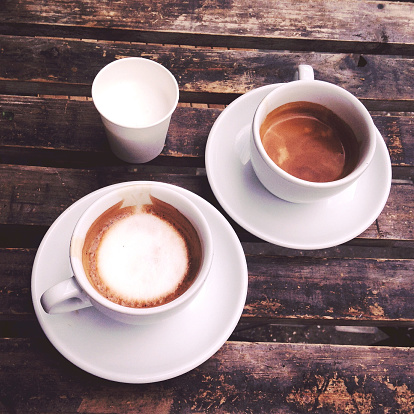
I love coffee, and I’ve written about it a lot over the past few years, from why it’s actually good for both mental and physical health, to reasons to drink java before a workout. So I wasn’t surprised when, for the first time in history, the Dietary Guidelines Advisory Committee gave coffee a thumbs up.
But many of the headlines pertaining to the report didn’t tell the whole story, leaving a lot of people wondering how much is really OK. To determine your daily dose, here are five factors to consider.
Everyone’s different
The Dietary Guidelines Advisory Committee looked at whether coffee poses any health risks, a topic they have previously been silent on. They concluded that strong evidence shows moderate coffee consumption (3 to 5 eight-ounce cups per day, or up to 400 milligram/day caffeine) isn’t tied to any long-term dangers for healthy people. Now, the word “healthy” is key (read on for more), and this is a general statement, not a directive. In other words, the committee isn’t saying that everyone should drink 3 to 5 cups a day.
Even if it may offer some benefits, it’s important to listen to your body. Some people can drink a strong cup of coffee and feel fantastic. Others may drink half a cup and feel jittery and be left with an upset stomach. There’s a lot of individual variation when it comes to how coffee makes you feel. So, don’t take this as a green light to down a pot a day. Consider what feels best for you. (And if the answer is none, there’s no reason to start drinking java.)
Read more: 20 Best Foods to Eat for Breakfast
Your current health matters
The committee considered healthy individuals. If you already have heart disease or other chronic conditions, you may still need to curb your coffee consumption. For example, I sometimes recommend coffee to my healthy athlete clients, but others who suffer from gastroesophageal reflux disease (GERD) or other digestive disorders feel much better when they eliminate it, as do those who have anxiety disorders. And while coffee hasn’t been shown to cause high blood pressure across the board, it may aggravate the condition. Bottom line: if you have any acute or ongoing medical conditions or your blood work values have been out of the normal range, talk to your doctor or personal dietitian/nutritionist about what’s best for you.
Be mindful of your sleep
One thing we know for certain is that caffeine interferes with sleep for most people, and catching enough zzz’s is critical for mental and physical well being, as well as for weight control (check out my previous post 5 Healthy Habits That Regulate Your Appetite). A good rule of thumb is to nix all caffeine at least six hours before bed. So if you’re tempted to pour another cup when you’re in an afternoon slump, find other ways to perk up, like going for a quick walk, listening to a five-minute guided meditation, or drinking a cold glass of water.
Read more: 18 Reasons Why Your Stomach Hurts
Your genetics play a role
Due to a genetic variation which affects a particular enzyme, some people break down caffeine at a very slow rate. It’s fairly common and, for these people, even a moderate daily coffee intake can increase the risk of heart disease and high blood pressure. Access to this genetic test was extremely limited until recently, but if you’re interested, a University of Toronto-affiliated company called Nutrigenomix now offers it, and you can order it through a registered dietitian.
Consider what else is in your cup
While I’ve written about coffee’s potential benefits, I still often recommend limiting it to just one cup in the morning. That’s because many people aren’t able to drink it without doctoring it up with some kind of milk and sweetener, and those extras can add up to surplus calories that feed fat cells. For example, 150 calories (roughly the amount in a skinny vanilla latte) doesn’t sound like much, but downing an extra 150 calories above and beyond what your body needs to support your ideal weight each day can leave you 10 to 15 pounds heavier. Not to mention that extra cups of Joe tend to crowd out water, the ultimate beverage for optimal health. Balance is always the goal.
Read more: Best and Worst Foods for Sleep
Cynthia Sass, MPH, RD, is Health’s contributing nutrition editor, and privately counsels clients in New York, Los Angeles, and long distance. Cynthia is currently the sports nutrition consultant to the New York Rangers NHL team and the Tampa Bay Rays MLB team, and is board certified as a specialist in sports dietetics.
This article originally appeared on Health.com.
More Must-Reads from TIME
- How the Economy is Doing in the Swing States
- Harris Battles For the Bro Vote
- Our Guide to Voting in the 2024 Election
- Mel Robbins Will Make You Do It
- Why Vinegar Is So Good for You
- You Don’t Have to Dread the End of Daylight Saving
- The 20 Best Halloween TV Episodes of All Time
- Meet TIME's Newest Class of Next Generation Leaders
Contact us at letters@time.com